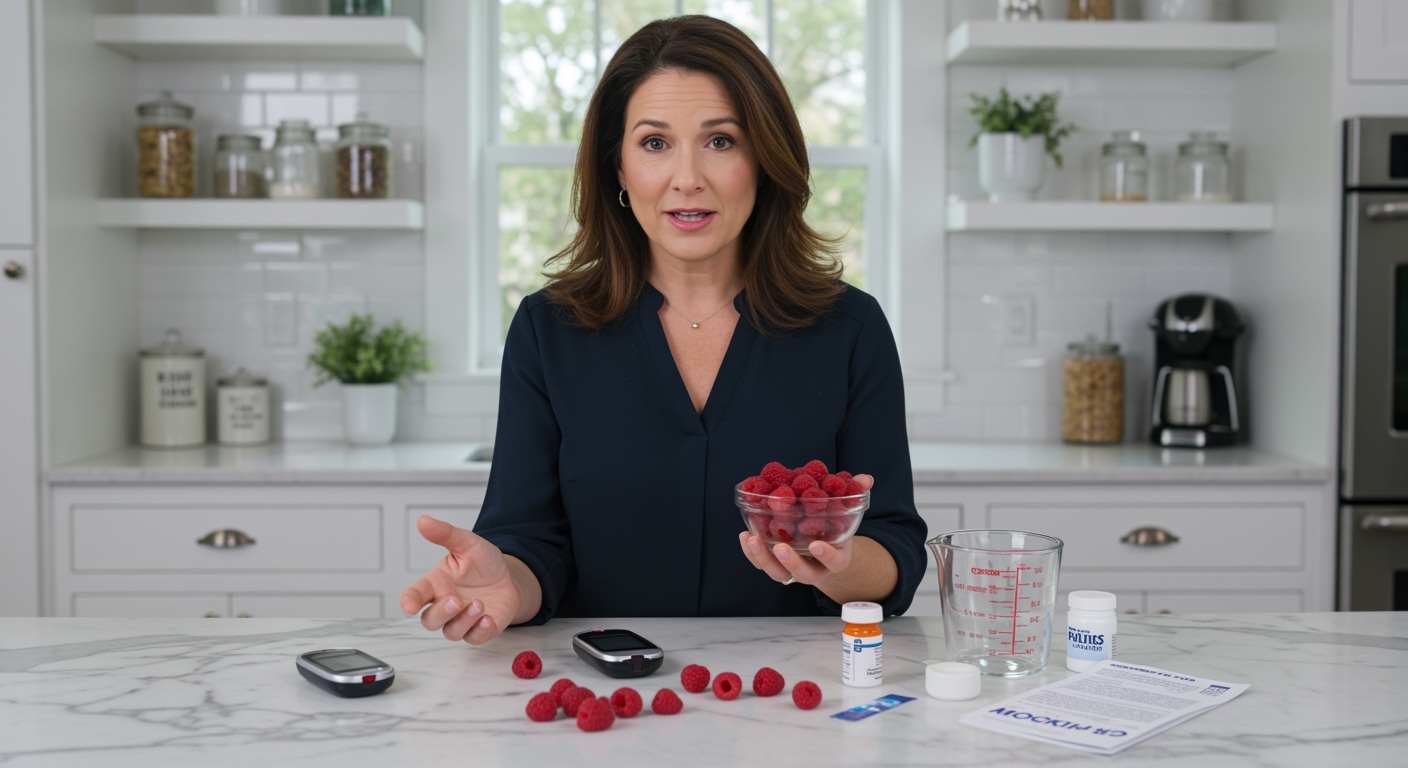✪ Key Takeaway: Raspberries are excellent for diabetes with low glycemic index and fiber that helps control blood sugar spikes.
Introduction
Your doctor tells you to watch your sugar intake, but then you see raspberries at the grocery store and wonder if these sweet berries will send your blood glucose soaring.
You might be asking this question because you love berries but fear they contain too much natural sugar for your diabetes management plan.
Hi, I’m Abdur, your nutrition coach and today I’m going to explain exactly how raspberries affect your blood sugar and why they might be one of the best fruits for diabetes control.
What Makes Raspberries Different From Other Fruits?
Raspberries contain only 5 grams of sugar per cup compared to 25 grams in a medium apple or 23 grams in a cup of grapes.
The glycemic index of raspberries sits at just 25, which places them in the low category that causes minimal blood sugar spikes.
Each cup of raspberries delivers an impressive 8 grams of fiber, which is more than most whole grain cereals provide.
This fiber content works like a natural brake system in your digestive tract, slowing down sugar absorption and preventing rapid glucose spikes.
The anthocyanins in raspberries give them their red color and also help improve insulin sensitivity at the cellular level.
Research shows these compounds can help your muscle cells respond better to insulin signals, making glucose uptake more efficient.
✪ Fact: One cup of raspberries contains the same amount of fiber as three slices of whole wheat bread.
How Do Raspberries Affect Your Blood Sugar Response?
When you eat raspberries, the high fiber content forms a gel-like substance in your stomach that slows gastric emptying.
This delayed emptying means sugars enter your small intestine gradually rather than flooding in all at once.
The pectin fiber in raspberries specifically helps regulate the rate at which glucose molecules cross your intestinal wall into your bloodstream.
Studies show that eating raspberries with a meal can reduce the overall glycemic response by up to 30% compared to eating the same meal without berries.
The natural compounds in raspberries also help activate GLUT4 transporters in your muscle cells, which are the proteins responsible for moving glucose from your blood into cells for energy.
This mechanism means your body becomes more efficient at clearing glucose from your bloodstream after meals.
The polyphenols in raspberries can also help reduce inflammation in your pancreatic beta cells, potentially improving long-term insulin production.
✪ Pro Tip: Eat raspberries at the beginning of your meal to maximize their blood sugar stabilizing effects.
Can Raspberries Help With Long-Term Diabetes Management?
Regular raspberry consumption has been linked to improved HbA1c levels in people with prediabetes and type 2 diabetes.
The ellagic acid in raspberries helps protect your blood vessels from the damage that high blood sugar can cause over time.
This compound works by reducing the formation of advanced glycation end products (AGEs), which are harmful molecules that form when proteins react with excess glucose.
Raspberries also contain quercetin, a flavonoid that helps reduce chronic inflammation associated with insulin resistance.
The magnesium in raspberries supports proper insulin function by helping your cells maintain healthy glucose metabolism pathways.
Studies suggest that people who eat berries regularly have a 23% lower risk of developing type 2 diabetes compared to those who rarely consume them.
✪ Note: Frozen raspberries retain the same blood sugar benefits as fresh ones and are available year-round.
What Is The Best Way To Include Raspberries In Your Diabetes Diet?
A half-cup serving of raspberries contains only 2.5 grams of sugar and provides excellent blood sugar control benefits.
You can safely eat up to one cup of raspberries per day without worrying about significant blood sugar spikes.
Pairing raspberries with protein or healthy fats further slows sugar absorption and creates an even more stable glucose response.
Try adding raspberries to Greek yogurt, mixing them into oatmeal, or eating them with a handful of nuts for optimal blood sugar control.
The timing of raspberry consumption matters too – eating them earlier in the day when your insulin sensitivity is typically higher works best.
Avoid raspberry juices or dried raspberries, which concentrate the sugars and remove the beneficial fiber that helps regulate blood glucose.
Fresh or frozen whole raspberries provide the maximum benefit for diabetes management while satisfying your sweet cravings naturally.
✪ Pro Tip: Add raspberries to your breakfast to help control blood sugar spikes throughout the entire day.
The Bottom Line
Raspberries are not only safe for diabetes but actively help improve blood sugar control through their low glycemic index, high fiber content, and beneficial plant compounds.
The best foods for diabetes are often the ones that work with your body, not against it – and raspberries are nature’s perfect example of this principle.
I would love to hear about your experiences with raspberries and blood sugar management, so please share your thoughts or questions in the comments below.
References
At NutritionCrown, we use quality and credible sources to ensure our content is accurate and trustworthy. Below are the sources referenced in creating this article:
- Hackensack Meridian Health: Raspberries: A Prediabetic-Friendly Fruit
- PMC: Effects of Berry Consumption on Glucose Metabolism
- Illinois Institute of Technology: Red Raspberries May Help Glucose Control in Pre-Diabetes
- Signos: Raspberry Glycemic Index and Blood Sugar Impact





